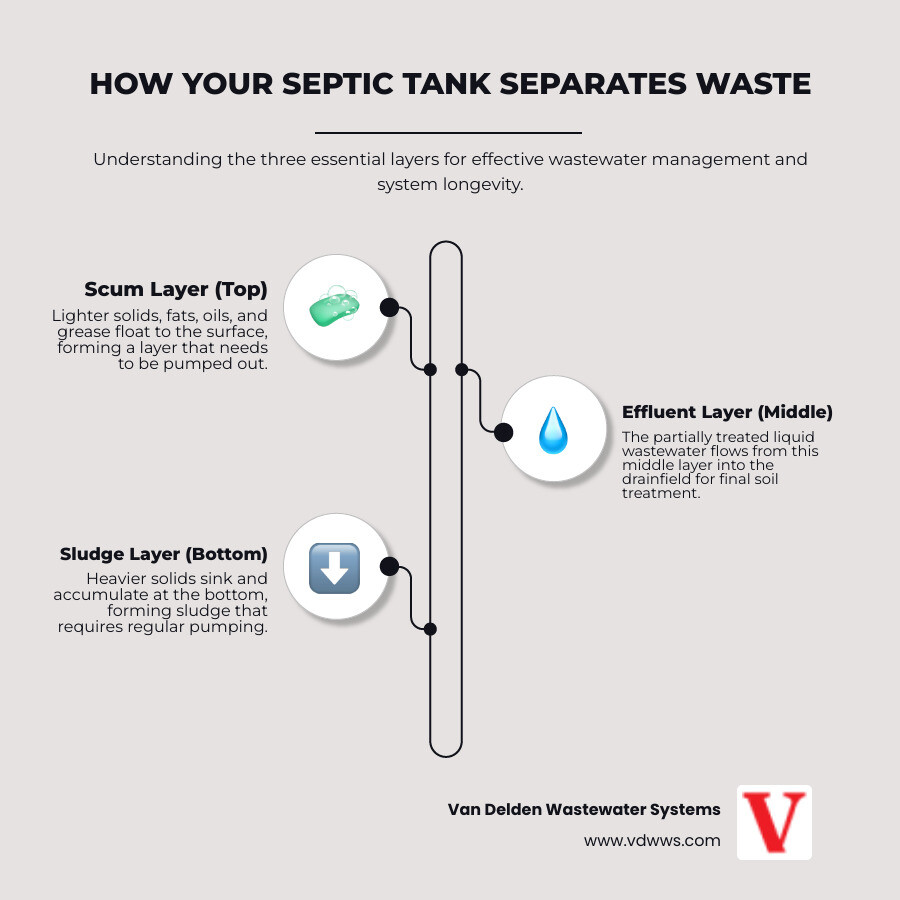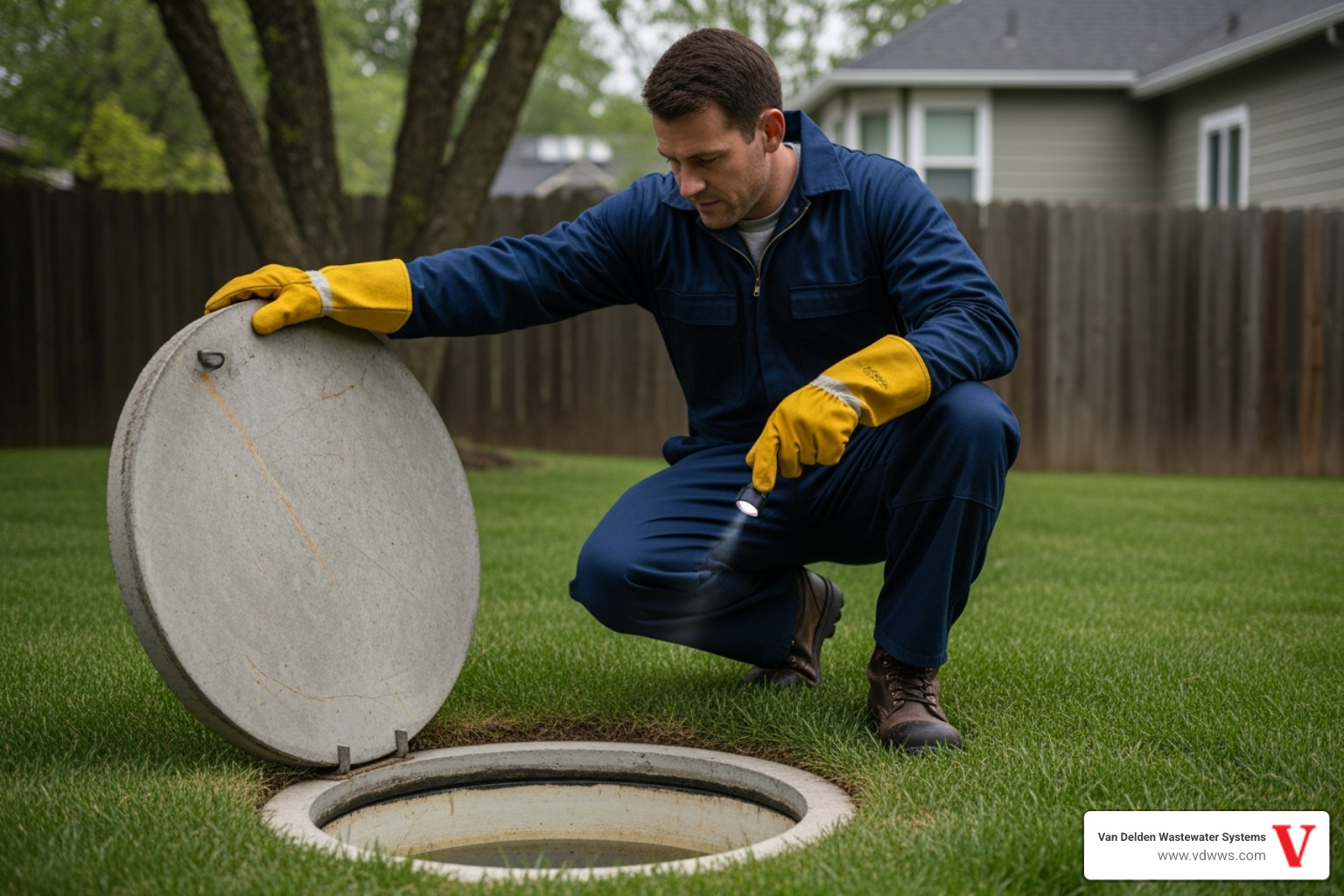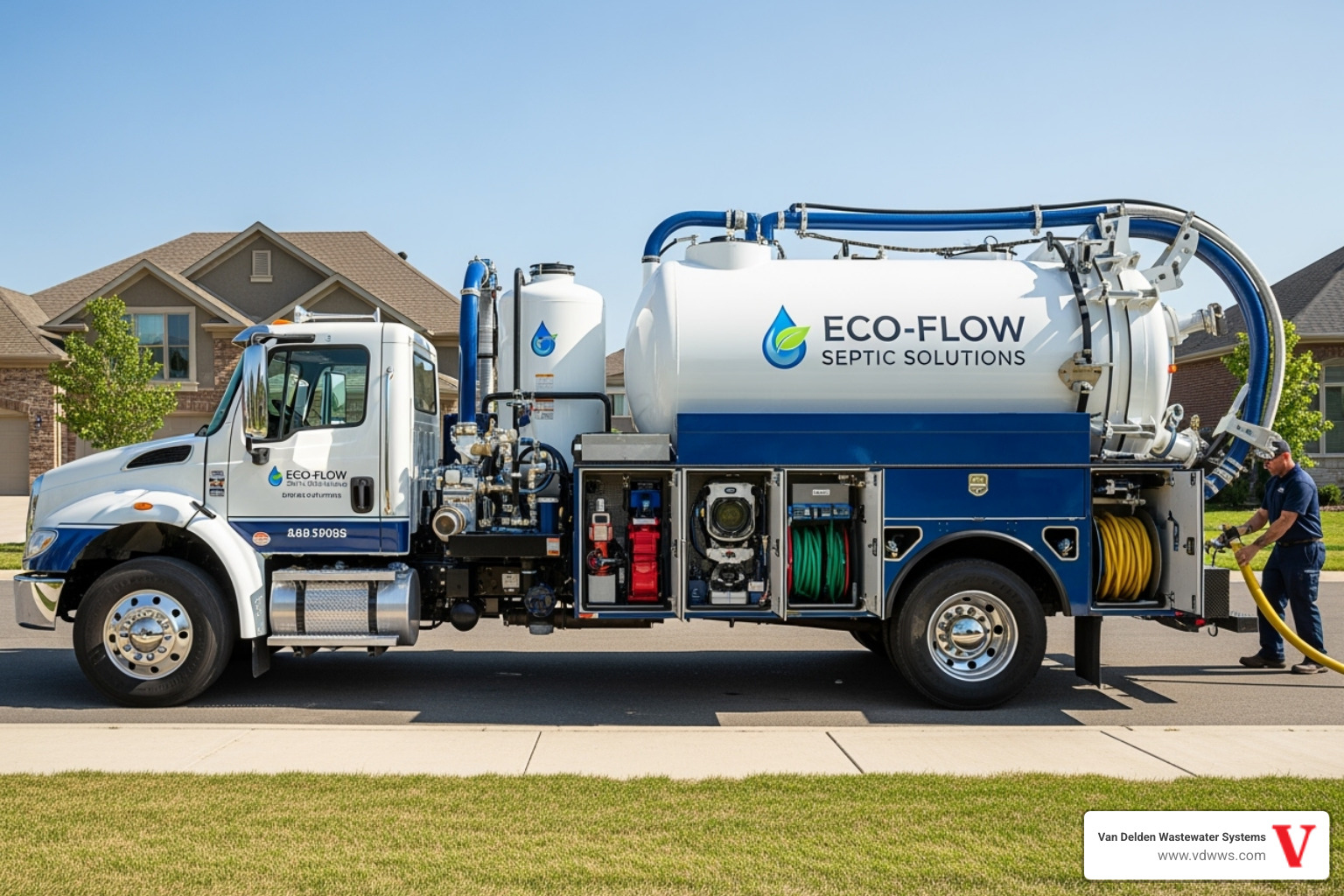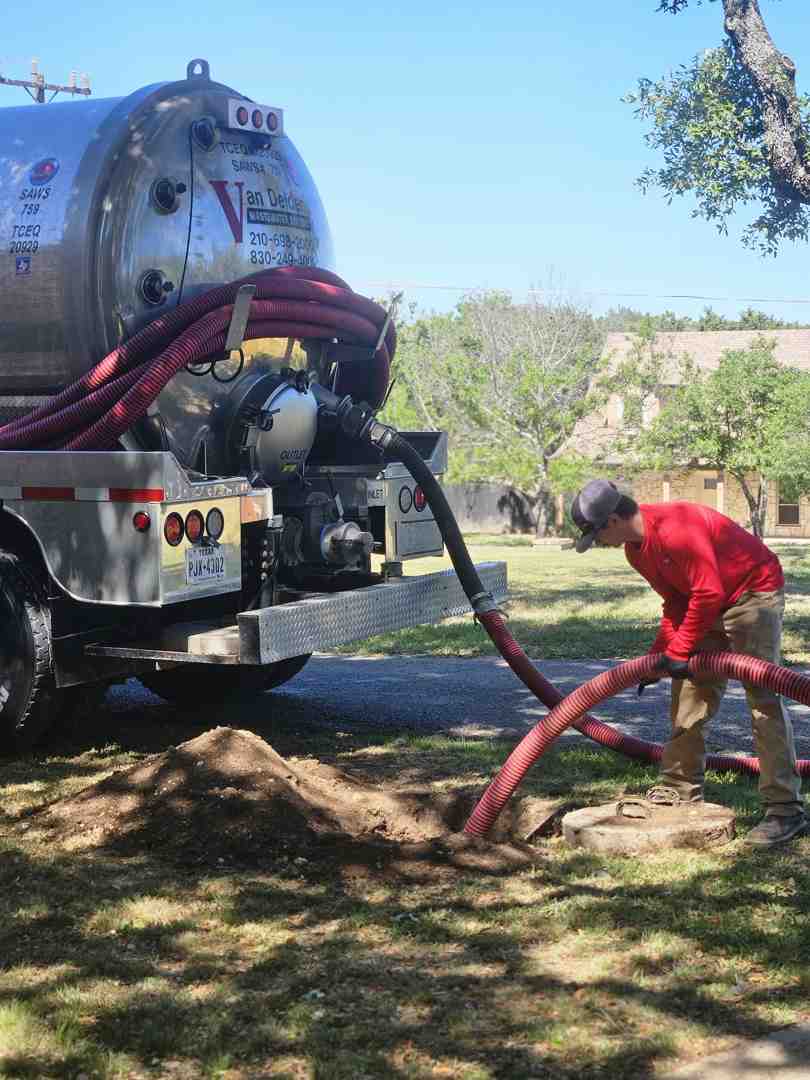Why Proper Septic Tank Maintenance Protects Your San Antonio Home
When you need septic tank cleaning san antonio tx services, you're looking for reliable professionals who can keep your wastewater system running smoothly. Choosing an experienced, reputable company is key to protecting your home and investment. Here's what you should know about professional septic services:
Average Cost Range: $375-$750 per cleaningRecommended Frequency: Every 3-5 yearsService Includes: Tank pumping, sludge removal, system inspection
Your septic system handles all the wastewater from your home - from toilets and showers to kitchen sinks and washing machines. Without proper maintenance, this critical system can fail, leading to expensive repairs, health hazards, and property damage.
In San Antonio's clay-heavy soil conditions, septic systems work harder to process waste effectively. Regular cleaning removes accumulated sludge and scum that can clog your drainfield and cause system failure.
The stakes are high. A failing septic system doesn't just mean inconvenience - it can contaminate groundwater, create health risks for your family, and cost thousands in emergency repairs. As one local expert notes: "When you do not have a properly functioning septic system it puts you, your family, and those in the area at risk of disease and other illness, even contaminating your drinking water."
Smart homeowners treat septic maintenance as essential home care, not an optional expense. Regular cleaning every 3-5 years costs far less than replacing a failed system or dealing with environmental contamination.

When Does Your Septic System Need Attention?

Your septic system works around the clock, quietly handling everything your household sends its way. Like any hardworking system, it needs regular care to keep performing at its best. The key is knowing when to step in before problems start knocking at your door.
Think of septic maintenance like caring for your car. You wouldn't wait for the engine to seize up before changing the oil, right? The same logic applies to your septic system. Regular attention prevents emergencies - and trust us, septic emergencies are never convenient or pleasant.
Several factors influence how often your system needs attention. Your household size plays a big role - more people means more wastewater flowing through your system daily. Your water usage habits matter too. Frequent long showers, multiple loads of laundry, and running the dishwasher daily all add up.
Here in San Antonio, our clay-heavy soil can make septic systems work harder than in other areas. This means staying on top of maintenance becomes even more important for local homeowners.
How Often to Clean Your Septic Tank
Most San Antonio homes need septic tank cleaning every 3-5 years, but your specific timeline depends on your unique situation. A busy household of five will likely need service closer to the 3-year mark, while a couple with minimal water usage might stretch it to 5 years safely.
Tank size makes a difference too. Larger tanks naturally take longer to fill up with sludge and scum. But here's something many homeowners don't realize - if you have a garbage disposal, you'll need more frequent cleanings. All those food scraps add extra solids to your tank, speeding up the accumulation process.
The number of residents in your home directly impacts your maintenance schedule. Each person adds roughly 70 gallons of wastewater daily to your system. More residents mean faster tank filling and more frequent service needs.
Both conventional and aerobic systems common in our area benefit from this regular pumping schedule. Think of it as preventive medicine for your septic system - a small investment that protects against much larger problems down the road.
For detailed guidance on maintaining your system between cleanings, check out our comprehensive resource on Septic System Maintenance San Antonio TX.
Telltale Signs Your Tank is Full
Your septic system has its own way of asking for help - you just need to know how to read the signals. When these warning signs appear, it's time to schedule your septic tank cleaning san antonio tx service promptly.
Foul odors around your property are often the first red flag. If you're catching whiffs of sewage smell near your tank area, drainfield, or even inside your home, gases are escaping where they shouldn't. This typically means your tank is full or has ventilation issues.
Slow drains throughout your home can signal trouble too. When sinks, tubs, and toilets all start draining sluggishly despite your best plunging efforts, your septic system might be struggling to handle the incoming wastewater.
Listen for gurgling sounds from your plumbing fixtures. These unusual noises often indicate air trapped in your system due to blockages or an overfilled tank. Your pipes shouldn't sound like they're having a conversation!
Sewage backup is the emergency signal you never want to see. If wastewater starts backing up into your toilets, showers, or sinks, your system is severely overloaded and needs immediate professional attention.
Keep an eye on your yard for wet spots or unusually lush green grass over your drainfield area. During dry weather, these soggy patches or super-green zones often mean wastewater is surfacing because your system can't process everything properly.
Don't wait for these warning signs to become full-blown disasters. Early intervention with professional cleaning can save you from costly repairs and messy situations. For more insights on recognizing drainfield issues specifically, visit our guide on Signs of Drainfield Problems in San Antonio Home.
The Professional Cleaning Process and Why It Matters
When your septic system gives you those telltale signs that it's full, it's time to call in the professionals. Attempting to clean a septic tank yourself is not only messy and potentially hazardous, but it often lacks the thoroughness required for proper system maintenance. Professional septic tank cleaning san antonio tx offers a multitude of benefits that extend beyond just emptying the tank.

Choosing a professional service ensures that the job is done right, protecting your family's health and the environment. Neglecting regular cleaning can lead to severe health risks, as untreated wastewater can contaminate groundwater and spread diseases. Environmentally, a failing system can pollute local water sources, harming ecosystems. On the flip side, regular professional cleaning significantly extends the lifespan of your septic system, preventing premature failures and saving you from the headache and expense of major repairs or even system replacement. It's an investment in your home's infrastructure and the well-being of your family and community.
What's Included in a Professional Septic Tank Cleaning in San Antonio, TX?
When you schedule a professional septic tank cleaning with us, you're getting a comprehensive service designed to ensure your system's optimal performance. Here's what our typical process entails:
- Locating the Tank: Our experienced technicians will efficiently locate your septic tank, even if it's buried. If you're unsure of its exact location, don't worry – we have the expertise to find it.
- Exposing Lids: The tank access lids need to be exposed. While some homeowners prefer to do this themselves, our team can handle the digging if the lids are buried, though it’s always good to clarify any potential additional charges for extensive digging when getting a quote.
- Pumping Process: Using powerful vacuum trucks, we carefully pump out all the liquid and solids from your tank. This includes the floating scum layer at the top, the wastewater in the middle, and the heavy sludge that has settled at the bottom. Our goal is to remove as much waste as possible to restore the tank's capacity.
- Sludge and Scum Removal: This is the core of the cleaning. We ensure that these layers, which can clog your drainfield if not removed, are thoroughly extracted.
- Baffle Inspection: The baffles (or tees) inside your tank are crucial for preventing solids from entering your drainfield. We inspect them for damage or blockages, ensuring they are functioning correctly.
- Checking for Issues: Beyond just pumping, our technicians conduct a visual inspection of your tank and system components. We look for signs of cracks, leaks, or other potential problems that could compromise your system's integrity. We may even ask you to flush a toilet to observe the flow and confirm proper filtration into the system after pumping. This comprehensive approach helps us identify minor issues before they become major headaches.
We believe in transparency and thoroughness. Our technicians are trained to not just pump your tank, but to educate you on its condition and provide detailed service forms, often with photo documentation, so you know exactly what was done and what to expect. This holistic approach is why professional septic tank cleaning san antonio tx is so important. For more details on what we do, visit our page on Septic Tank Pumping San Antonio TX.
Understanding Different Septic Systems
Not all septic systems are created equal, and understanding the type you have can help you appreciate its unique cleaning and maintenance needs. In San Antonio, you'll primarily encounter two main types: Conventional and Aerobic systems.
| Feature | Conventional Septic Systems | Aerobic Septic Systems |
|---|---|---|
| Treatment Method | Passive, relies on natural bacterial processes in the tank and soil absorption field. | Active, uses an aerator to introduce oxygen for more efficient bacterial breakdown of waste. |
| Components | Septic tank, distribution box, drainfield (leach field). | Septic tank, aeration chamber, clarifier, pump tank, disinfection unit, spray or drip irrigation field. |
| Maintenance | Regular pumping (3-5 years), careful water usage, avoiding harmful chemicals. | Regular pumping (3-5 years), more frequent inspections (often quarterly), electricity for aerator, mechanical parts. |
| Cost | Generally lower installation and maintenance costs. | Higher installation and potentially higher maintenance costs due to mechanical components and inspections. |
| Effluent Quality | Treated effluent is good, but still requires soil for final treatment. | Higher quality effluent that can often be discharged above ground or through drip irrigation. |
| Complexity | Simpler design, fewer mechanical parts. | More complex, with moving parts and electronic controls. |
| Soil Suitability | Best for permeable soils. | Suitable for less permeable soils or smaller lots where conventional systems aren't feasible. |
Conventional Systems: These are the most common and traditional types. Wastewater flows from your home into a septic tank, where solids settle (sludge) and lighter materials float (scum). The liquid effluent then flows out to a drainfield, where it's absorbed into the soil for final treatment. Cleaning these systems primarily involves pumping out the accumulated sludge and scum from the tank to prevent it from overflowing into the drainfield.
Aerobic Systems: These systems are more advanced and are often used in areas with less permeable soil or where a higher level of treatment is required. Unlike conventional systems, aerobic systems introduce oxygen into the treatment tank, which encourages the growth of aerobic bacteria that break down waste more efficiently. This results in a cleaner effluent that is often disinfected before being discharged, sometimes via sprinkler or drip lines. Because they have more mechanical parts (like aerators and pumps), aerobic systems typically require more frequent inspections and specialized maintenance in addition to regular pumping. Their complexity often necessitates specific maintenance contracts to ensure all components are functioning correctly.
The type of system you have will influence the specific cleaning process and the expertise required. Our technicians are well-versed in servicing both conventional and aerobic systems, ensuring that your specific system receives the appropriate care. For a deeper dive into the mechanics of these essential home systems, you can find More info about septic systems.
Understanding the Cost of Septic Tank Cleaning in San Antonio, TX
Nobody loves talking about expenses, but when it comes to septic tank cleaning san antonio tx, it's important to shift your perspective. Think of it less as a dreaded bill and more as smart financial planning for your home. Just like you wouldn't skip oil changes for your car, regular septic maintenance is essential preventative care that keeps bigger problems at bay.
The reality is simple: investing in quality septic cleaning today prevents the nightmare scenario of emergency repairs tomorrow. We've seen too many homeowners learn this lesson the hard way, facing thousands in unexpected costs because they put off routine maintenance. Don't be that homeowner calling us on a weekend with sewage backing up into their house!
When you choose professional septic tank cleaning san antonio tx services, you're not just paying for someone to pump your tank. You're investing in expertise, proper equipment, and peace of mind. Quality technicians bring years of experience, thorough inspections, and the ability to spot potential problems before they become disasters. That's worth every penny.
Average Cost and Key Factors
The cost of septic tank cleaning in San Antonio varies based on several important factors. Understanding these helps you budget appropriately and avoid surprise charges when you get your quote.
Tank size plays the biggest role in determining cost. A larger tank holds more waste, takes longer to pump, and requires more disposal fees. If you're unsure of your tank size, don't worry – our technicians can help you figure that out during the service call.
System type also matters. Conventional septic systems are typically straightforward to service, while aerobic systems may require additional considerations due to their more complex components and specialized maintenance needs.
Accessibility can significantly impact your final bill. If your tank is buried under a deck, surrounded by mature landscaping, or located far from where our service truck can park, expect some additional charges. The good news? Many homeowners can reduce costs by clearing access paths and even digging up buried lids themselves before we arrive.
Digging and dump fees are two cost factors to discuss upfront. Some companies include these in their base price, while others charge them separately. Always ask for a complete breakdown when requesting your quote – nobody likes billing surprises.
When you call Van Delden Wastewater Systems for an estimate, we'll ask detailed questions about your system to provide the most accurate pricing possible. The more information you can share, the better we can serve you.
Septic Cleaning vs. City Sewer Fees
Here's something that might surprise you: maintaining a septic system often costs less than city sewer fees when you break it down monthly. While your neighbors with city connections pay every month, you only need professional cleaning every three to five years.
Let's do some simple math. City sewer fees add up month after month, year after year. When you calculate the total cost over a three-to-five-year period, septic maintenance often comes out ahead financially. Plus, you're not subject to annual rate increases that seem to hit municipal services regularly.
Beyond the direct cost savings, septic system ownership gives you control over your wastewater treatment. You decide when to schedule maintenance, which company to use, and how to care for your system. That independence has real value, especially when you consider the long-term financial benefits of proper septic care.
The key to maximizing these savings? Consistent, proactive maintenance that extends your system's lifespan and prevents costly emergency repairs. For detailed strategies on protecting your investment, check out our guide on how to Extend Septic System Lifespan in San Antonio.
A well-maintained septic system can last decades with proper care. That's a pretty good return on investment for something that handles one of your home's most essential functions every single day.
Frequently Asked Questions about Septic Cleaning
Over our 86+ years in business, we've heard just about every septic question imaginable! San Antonio homeowners are smart to ask questions about their systems - after all, knowledge is power when it comes to protecting your investment. Let's explore the most common questions we get about septic tank cleaning san antonio tx.
What information do I need to get an accurate quote?
Getting a precise quote for your septic tank cleaning san antonio tx service starts with having the right information ready. Think of it like going to the doctor - the more details you can share, the better we can help you.
System type is our starting point. Do you have a conventional system or an aerobic system? If you're not sure, look around your yard. Aerobic systems often have sprinklers that spray treated water or an alarm panel somewhere near your home. These are dead giveaways that you've got the more advanced system.
Tank size matters more than you might think. A 1,000-gallon tank takes different equipment and time than a 1,500-gallon tank. You might find this information on old building permits, previous service reports, or sometimes even stamped on the tank lid itself. Don't worry if you can't find it - we can often estimate based on your home's bedroom count.
Lid details help us come prepared. How many access lids does your tank have? Are they sitting right on top of the ground, or are they buried under soil, landscaping, or that beautiful flower bed you planted last spring? Knowing this ahead of time helps us bring the right tools and quote any potential digging fees accurately.
Your service history tells us a lot about what we'll find. When was your last pumping? Three years ago? Never? (Don't worry, we don't judge!) This helps us estimate how much sludge and scum have built up.
Finally, any current issues you're experiencing - like slow drains, mysterious odors, or wet spots in the yard - help us understand if this is routine maintenance or if there might be additional concerns to address.
Can I use additives to avoid pumping my septic tank?
We get this question a lot, and we totally understand why. Who wouldn't want a magic powder that eliminates the need for pumping? Unfortunately, additives cannot replace regular septic tank pumping.
Here's the thing about your septic system - it's already a perfectly balanced ecosystem. The bacteria naturally present in your tank are incredibly efficient at breaking down organic waste. They don't need expensive supplements or boosters to do their job well.
The real issue is that some materials simply can't be broken down by bacteria. Inorganic solids settle to the bottom as sludge, while fats, oils, and grease float to the top as scum. No amount of bacteria, natural or added, can make these materials disappear completely.
Some additives can actually cause more harm than good. They might disrupt your tank's natural bacterial balance or even push solids into your drainfield before they're properly broken down. This can lead to premature drainfield failure - a much more expensive problem than regular pumping.
Regular pumping is the only proven method for removing these accumulated materials and keeping your system healthy. Think of it this way: you wouldn't expect vitamins to eliminate the need for dental cleanings, right? Same principle applies here.
What happens if I neglect to clean my septic tank?
Skipping septic tank cleanings is like playing septic roulette - and the house always wins eventually. The consequences start small but can quickly escalate into expensive, messy disasters that no homeowner wants to face.
System failure is the inevitable end result of neglect. As sludge and scum layers grow thicker, they take up space meant for incoming wastewater. Eventually, these solids overflow into your drainfield, where they absolutely don't belong. Your drainfield is designed to handle liquid effluent, not chunks of waste.
Once solids clog your drainfield, you're looking at costly repairs that can run into thousands of dollars. Replacing a failed drainfield costs far more than years of regular pumping combined. It's like skipping oil changes until your engine seizes - the "savings" disappear quickly when you need a whole new engine.
Property damage becomes a real possibility when systems fail. Sewage backing up into your home through toilets and drains creates unsanitary conditions and can ruin flooring, furniture, and personal belongings. Outside, you might find foul-smelling puddles of wastewater surfacing in your yard - not exactly the landscaping feature you had in mind.
The health hazards are perhaps the most serious consequence. Untreated sewage contains harmful bacteria, viruses, and pathogens that can contaminate groundwater and pose serious risks to your family's health. When septic systems fail, they can contaminate drinking water wells and spread disease - putting not just your family at risk, but your neighbors too.
Delaying maintenance doesn't save money - it just turns a manageable expense into a crisis. For more information about recognizing the warning signs of drainfield problems, check out our guide on Drainfield Saturation Signs in San Antonio.
Partner with San Antonio's Trusted Septic Experts
Taking care of your septic system isn't just about avoiding problems - it's about protecting one of your home's most important investments. When you stay on top of regular maintenance, you're giving yourself genuine peace of mind. You know your family is safe, your property is protected, and you won't face any unpleasant surprises.

At Van Delden Wastewater Systems, we've been helping San Antonio families keep their septic systems running smoothly since 1937. That's over 86 years of experience dealing with every type of septic challenge you can imagine. We're not just another service company - we're your neighbors, and we understand exactly what septic systems in our area need to thrive.
What makes us different? We believe in doing things the right way. Our technicians are background-checked and non-commissioned, which means they're focused on giving you honest advice, not trying to sell you services you don't need. When we finish a job, you'll get detailed service forms and photo documentation so you can see exactly what was done and understand the condition of your system.
We don't just pump your tank and drive away. We take time to educate you about your system, answer your questions, and help you understand what to watch for in the future. It's this commitment to customer service and transparency that has kept families trusting us for nearly nine decades.
Your septic system works hard every single day to keep your home comfortable and sanitary. Doesn't it deserve the same level of care and expertise that has been trusted by San Antonio homeowners for generations?
For reliable and thorough service, schedule your Septic Tank Cleaning San Antonio TX today.
Customer Reviews
Peter was personable, professional and thorough. Highly recommend Van Delden. You might be able to find a cheaper company but not better!
On time. 100% professional, knowledgeable, and courteous. Very helpful and straightforward. That is the bar all businesses should strive for.
It has been a pleasure working with your company. Not only did y’all communicate very well but your workers were always polite! Thank you!
“I thank Van Delden for such prompt service. Honest people are hard to come by these days. I will certainly recommend Van Delden to anyone! Jesse is an upstanding young man and very nice to talk to. I thank everyone at Van Delden for taking such good care of me.”
This is just a note to thank you for explaining the problem with my system. You didn’t have to be so kind and I appreciate your good business ethics and time spent. In the future you will have mine in return!






